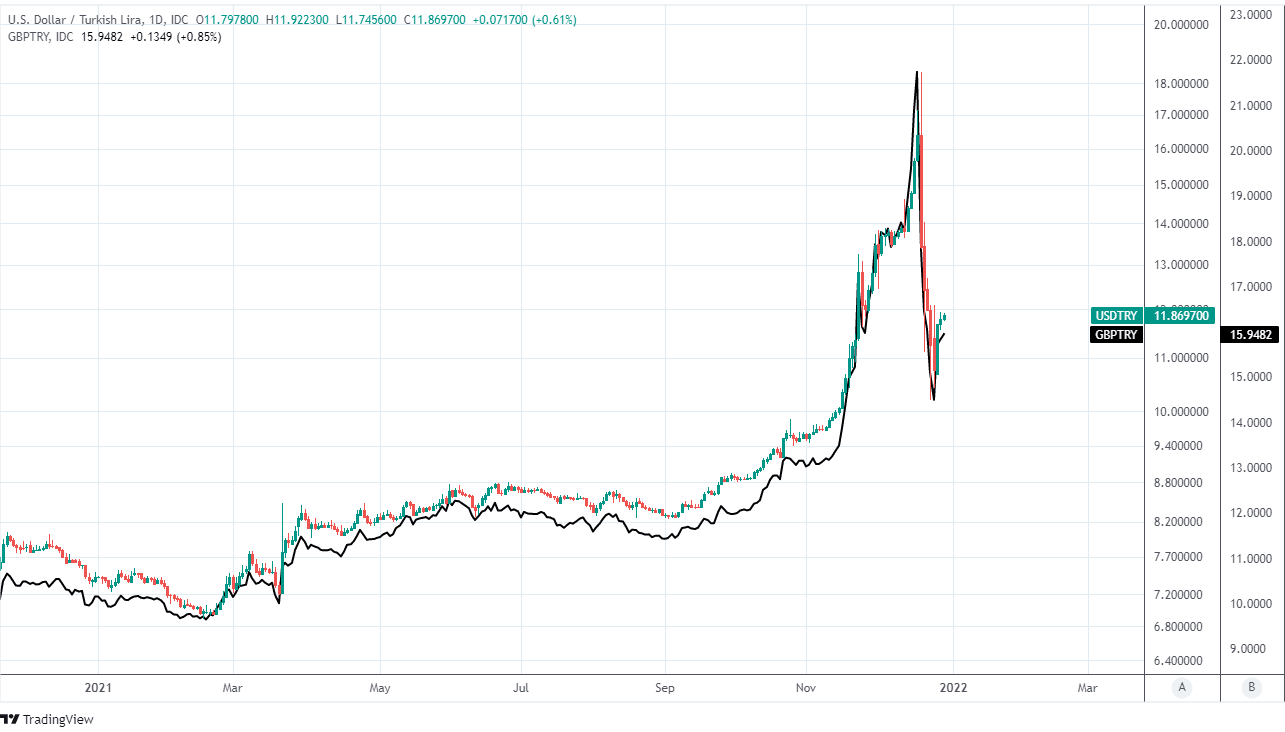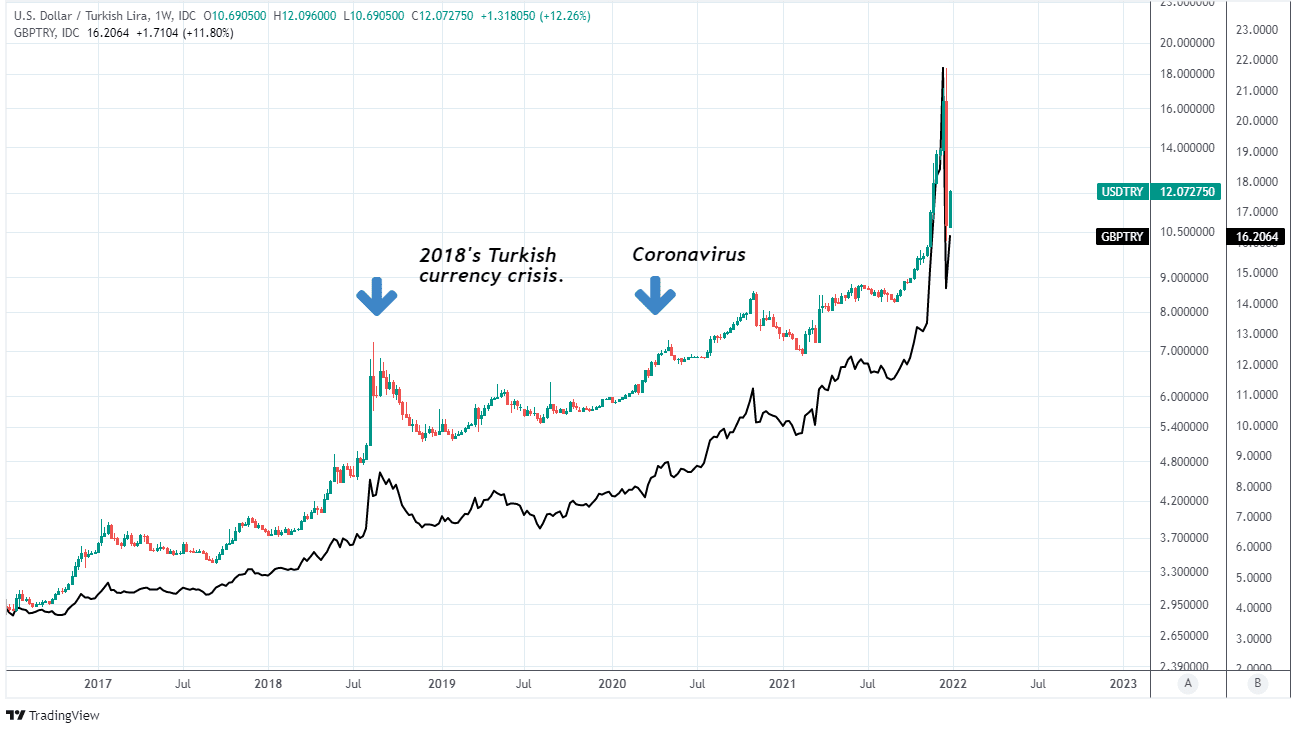Turkish Lira Could Rise Further in New Year
- Written by: James Skinner
- TRY recoups December loss in 60% rally
- Potential for further ‘short squeeze’ in Jan
- Leading TRY to rebound early in new year
- But analysts warn of fresh spiral in 2022

Image © Adobe Stock
The Turkish Lira recouped all of the losses sustained against the Dollar and Pound in December over the festive holiday and could rise further in the new year, although many analysts are unconvinced that its recovery can be sustained for long.
Turkey’s Lira rose more than 60% in the final stretch of December, pushing GBP/TRY and USD/TRY lower by 30% or more after the government announced a series of measures aimed at addressing ‘Dollarisation’ among domestic savers and its impact on the Lira, as well as high inflation.
The introduction of a bank deposit scheme that protects household savings from adverse movements in the Lira has been credited with turning the tide for the currency, which had fallen by around 50% against the Dollar and Pound for 2021 up until December 20.
“There is a non-negligible risk that the moves we have observed this week are the result of large-scale state intervention in very illiquid markets,” warns Cristian Maggio, head of portfolio strategy at TD Securities.
“We still lack evidence that investors (especially locals) have turned en masse to converting hard currency into lira. Rather, the latest information on reserve usage provides strong evidence that the CBRT has used the big guns, through both direct intervention and its swap program,” Maggio says.
Above: USD/TRY shown at daily intervals alongside GBP/TRY.
Secure a retail exchange rate that is between 3-5% stronger than offered by leading banks, learn more.
The Lira’s recovery has built in thin holiday markets and if TD Securities’ Maggio is right in suspecting CBRT intervention then it would mean there is potentially a further adjustment to play out as market conditions normalise in January.
Many traders could find themselves underwater on bets against the Turkish currency when returning to the office in January and should this prompt a bout of position reduction then it could prompt an extended ‘short squeeze’ that lifts the Lira further over the coming weeks.
That would keep USD/TRY and GBP/TRY under pressure in the short-term, although many analysts doubt the Lira’s recovery will be sustained for long.
“We do not see what supportive role these new policies might play for the exchange rate in the medium term. We forecast lira depreciation to resume in coming months,” cautions Tatha Ghose, an emerging market and currency analyst at Commerzbank.
“The changes announced by the government this week fall into the category of treating the symptoms, not the cause. It is almost as if President Tayyip Erdogan asked his advisors what was troubling households and corporates – and they provided him with a list of symptoms,” he told clients last week.
{wbamp-hide start}{wbamp-hide end}{wbamp-show start}{wbamp-show end}
The recently announced government measures were intended to address the impact that high and rising inflation has had on parts of the population in Turkey, much of it driven by depreciation of the currency, and included was a planned 50% increase in the national minimum wage.
However, it’s the Lira savings deposit scheme and its potential to persuade households to convert foreign currency savings back into Lira and resist selling the currency in exchange for more stable alternatives in the future that is credited with igniting the nascent recovery.
“Although the announcement had a notable impact on the Lira and may contribute to easing the concerns of depositors, the measures do not address the fundamental reason for the depreciation of the currency and rising inflation, in our view” says Murat Unur, a CEEMEA economist at Goldman Sachs.
While the Lira’s late December rally has been nothing short of spectacular, many analysts have warned that it could be unlikely to last because the government policies that are driving it will themselves be unlikely to address the Turkish currency and economy’s ailments.
“USDTRY may find some short-term reprieve, possibly strengthened by speculative longs that want to ride the enthusiasm of the moment. But the long-term macro financial weaknesses of Turkey are still all there,” TD Securities’ Maggio says.
Above: USD/TRY shown at weekly intervals and on a logarithmic scale, alongside GBP/TRY.
While the Lira’s recovery could potentially extend further in January, analysts at Commerzbank, TD Securities and Goldman Sachs all forecast a resumption of its 2021 spiral over the coming months.
They cite the CBRT’s repeated interest rate cuts this year in the face of high and rising inflation for the near halving of value in the Lira between early September and December 20, a period in which the cash rate was cut from 19% to 14% as inflation rose to more than 21%.
“Over the medium run, we think that the macroeconomic fundamentals will drive a U-turn in the policy rate and, if it is indeed realized, this monetary policy tightening may eventually serve to moderate Lira depreciation more sustainably,” Unur and Goldman Sachs’ colleagues wrote in a recent note.
“Until a more sustainable policy mix is credibly indicated, however, pressure will remain on the Lira over the short-run. Reflecting these factors, we are shifting our USD/TRY forecasts to 18, 19 and 18 in 3, 6 and 12 months, respectively (from 12, 12.5 and 13 previously),” they also said.
Rising energy prices and Turkey’s fast growing economy have both played a role in stoking inflation pressures that have become politically toxic and recently prompted President Recep Tayyip Erdogan to threaten intervention through price controls and other measures.
But much of Turkey’s inflation is often the result of the frequent declines in the Lira that result from the CBRT’s approach to interest rate policy, which the market perceives as being under the control of President Erdogan.
“It has but one simple root cause – inadequate inflation targeting and inappropriate monetary policy (with no credibility that the central bank can get back to the appropriate policy),” Commerzbank’s Ghose said in a research note last Wednesday.


